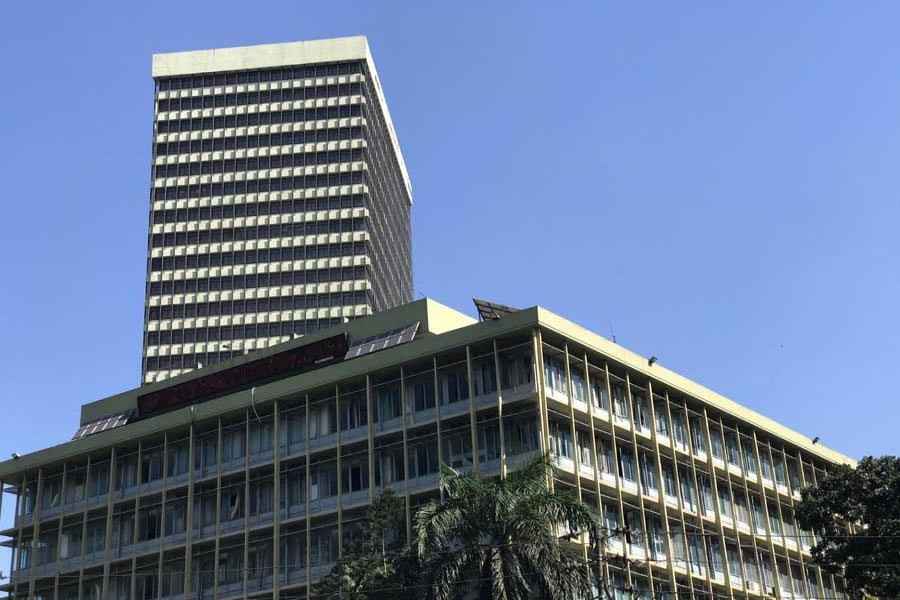Constituted and run as the country's central bank under the purview of Bangladesh Bank Ordinance 1972, Bangladesh Bank (BB) serves as the supervisory cum controlling authority of the nation's banking sector. Although the commercial banks operate their businesses with money deposited by the public, the depositors have in fact no direct control over their deposits. Ensuring the security and utilisation of these deposits through regulatory means is the principal function of the central bank.
The banking sector of Bangladesh has gradually expanded since independence accompanied by infusion of incrementally larger volumes of savings and credits as well as investments in various sectors. But the banks have been routinely bedevilled by irregularities and corruption, credit frauds, high rates of loan defaults, inadequacy of capital, inconsistent rates of interest and liquidity crises, especially during the previous decade. Although the defaulted loans declined between 2009 and 2011, the default rate has once again risen sharply since 2012. As a consequence, the supervisory role of Bangladesh Bank has often come under question.
The Bangladesh Chapter of Transparency International (TIB) conducted a study during 2019-20 titled 'Supervising the Banking Sector and Controlling Loan Defaults: Good Governance Challenges of Bangladesh Bank and Way Forward', which was released in September this year. Its findings have shed light on the weaknesses of the central bank and how these can be overcome through improvements in the governance framework.
According to TIB, three handicaps broadly exist in the supervisory cum regulatory functions of the central bank. The first one is limitations in its legal cum policy framework that curtails its independence, limits its role as a regulator, and provides scope for interferences by businesses and politicians. The political interferences mainly emanate from businessmen belonging to the ruling party. They initiate changes in laws, rules and policies that facilitate their influence and control over the banking sector. Dual control of the sector by the Financial Institutions Division also curbs the independence of BB and creates hindrances in its operations. The vested coteries allegedly influence the banks by utilising political connections, make BB amend policies in accordance with their preferences, force the central bank to change supervisory decisions, ignore rules and regulations, and also create syndicates for award of loans by undermining the independence of BB.
The Basel Committee on Banking Supervision has been working since 1974 on rules or principles that reduce the risks of assets held by banks and strengthen their financial health. According to this committee, relevant laws in Bangladesh often clash with the core principles of effective banking supervision devised by it with regard to the independence, objectives, responsibilities, powers etc. of the central bank.
The Basel principle on the duties and objectives of supervisory authority for establishing a healthy and secure arrangement for banks has been only partially achieved in Bangladesh. Similarly, the Basel principle on establishing a framework for independence and accountability of the supervisory authority has only been partially met because of scopes for government interference. The principle of a clear and transparent process for appointments and removals of the BB chief executive and members of its board is completely lacking in the absence of such legal provisions. Besides, the principle of according powers to the supervisory authority for awarding punishments has only been partially met as the central bank cannot authorise liquidation or merger of banks and remove directors. Although BB enjoys the right to enter any bank for ensuring adherence to its rules and regulations, and also has the power to set or amend prudential standards, these are hindered by political interferences and lack of application.
TIB opines that irregularities, corruption and violation of laws have increased manifold due to weaknesses in the control and supervisory functions of BB, as well as lack of goodwill of the government. Instead of taking appropriate steps for recovery of defaulted loans, BB has repeatedly amended relevant rules and policies that have made the banking sector defaulter-friendly. In a way, loan default has been institutionalised, which is encouraging regular credit-recipients to become defaulters. As a consequence of huge loan defaults, a severe capital crisis has been created in the banking sector, especially in state-owned commercial banks. Subsidies are being given to these banks from the taxes paid by citizens for overcoming their deficits. It implies that the burden of irregularities and corruption committed by some are being passed on to the general public. These defaulted loans are in turn encouraging money laundering abroad and investments in unproductive sectors, as well as upending the healthy growth of the banking sector.
In the above backdrop, a number of recommendations have been put forward by TIB for rectifying the situation through overcoming the governance challenges faced by Bangladesh Bank. These include constitution of an independent commission for carrying out reforms in the banking sector, and according the central bank full powers for control and supervision of state-owned banks by amending sections 46 and 47 of the Bank Companies Act. There should be specific policies for appointment and removal of the members of board of directors of Bangladesh Bank including its governor and deputy governor, with clear-cut directives regarding the appointment process. The number of private sector representatives (like finance sector specialists) should be increased in the BB board of directors by replacing government officials.
All provisions in the relevant laws that run counter to the interests of depositors and aids in the dominance of families in banks should also be rescinded. Provision should be incorporated for a panel that should be constituted through a search committee, from which the bank directors should be appointed. People involved in politics should not be nominated for these positions and there should be provision for BB's oversight of loans taken by the bank directors. Besides, the names of loan defaulters who reschedule their loans repeatedly should be disclosed publicly, and there should be stipulation for keeping security provisions against the defaulted loan payments stayed by courts.
Dr Helal Uddin Ahmed is a retired Additional Secretary and former Editor of Bangladesh Quarterly.


